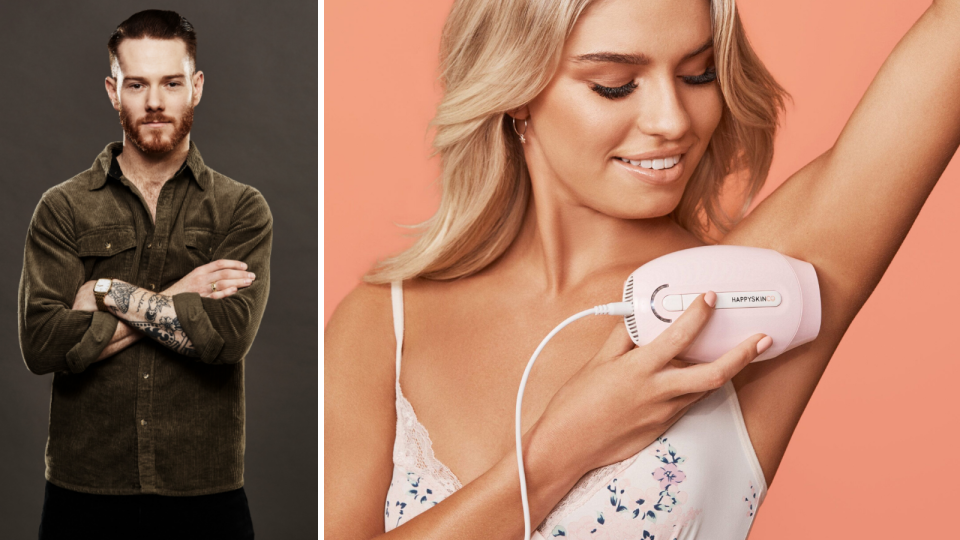‘Completely by accident’: How this uni drop-out started a $25m business

“I wasn’t entrepreneurial – I wasn’t the type of kid that had a lemonade stand,” Dylan Mullan, co-founder of DIY laser hair removal tool Happy Skin Co tells Yahoo Finance.
Since its inception in 2018, Happy Skin Co has turned over $25 million, so you’d be forgiven for mistaking he was.
But he stands firm. “That just wasn’t me.”
In fact, Mullan says he made the decision in middle school that he would become a corporate lawyer.
“My whole high school years I looked forward to that. To be honest, I think it was that teenage boy thing where you thought the cool thing to do was to go work in the city and wear a suit and tie – you think it’s cool when you’re a kid,” he said.
But two months into his university degree, he had a change of heart.
“I knew straight away, honestly two weeks in I thought, ‘This isn’t for me’.”
Mullan gave himself the rest of the year off, and wanted to do the exact opposite of what he was doing: acting.
Also read: How two Aussie boys made $20 million selling pink face masks
Also read: Coffee shop to billion-dollar startup: Lucy Liu shares the Airwallex story
Also read: 'Fake Tan Millionaire' reveals his 9am non-negotiable ritual
“I felt like that’d be fun, it would be something enjoyable,” he said.
The next three to four years of his life, Mullan was acting full-time; he had an agent, starred in ads, filmed short films and almost landed gigs in Hollywood.
But being an actor, he felt an overwhelming sense that he just couldn’t control how his life was playing out, and decided to try his hand at ecommerce with a friend in a similar position.
“I had a friend, who left the business about a year ago, who was also in the same position as me – he was acting, and he wanted to get into business,” he said.
“Ecommerce is obviously the best place to start if you’re someone who doesn’t have a whole lot of initial investment, and we saw a lot of potential in the beauty industry.”
Mullan and his business partner threw in $10,000 each as an initial investment to the business. And, $25 million later, it seems that investment has paid off, something he credits to the exponential growth of DIY beauty products.
“If you look at the patterns, anything you can do at home that is traditionally done in a clinic or a salon, and will give people very similar results for a much more affordable price and in a much more convenient way, will be successful,” said Mullan.
Just look at Bondi Sands founder Shaun Wilson, who made millions from creating a self-tanning product, or Alya Skin founders Manny Barbas and James Hachem, who made $20 million from pink clay masks.
“It’s a very common path – two guys that launch beauty companies,” Mullan said.
Why laser skin removal?
“It’s a weird story, and it was completely by accident,” Mullan said.
Mullan and his partner saw an ad for an electric razor with a light attached to it so you could see the hairs, which got them thinking about laser hair removal.
“We’d never seen it before. We did our best research and couldn’t find anything, and went down weird paths of technology trying to figure out whether we’d burn the hairs – how was it all going to work?” he recalls.
After almost two months of just research, Mullan said the process looked like it was going to be too difficult.
It was then that they boys stumbled on some manufacturers doing something similar to Happy Skin co.
“There was a handful of them, and we started to work with them, iterating the product and updating things, changing things – and we ended up partnering with who could do it best,” he said.
“We didn’t invent the technology. A lot of people think we did, because we were the first company to really build a brand around hair removal, but there were a couple of traditional companies that had them, they just didn’t have exposure.”
But he admits it wasn’t the easiest process.
“We didn’t really pick the easiest product to start off with,” he said.
“It would have been much easier to start with a face mask – we started something pretty complex in terms of how it works with skin, everything that goes into the machine and care and the process. It was really difficult in that respect.”
Next year, Mullan has plenty on the cards.
“It’s still in the beauty space, still all about solving problems and issues around skin that might not necessarily be involved in hair removal,” he said.
Coronavirus has been good for sales
The at-home care industry has been thriving as salons and clinics have been forced to close their doors, and it’s something Happy Skin Co has definitely capitalised on, Mullan said.
“I haven’t checked [sales] – I’ve been so busy with everything that’s going on, trying to keep up with demand and logistical things,” he said.
“Unfortunately, a lot of people are out of work and so if they’re wanting to do [at-home care], they’re going to want to take the more affordable option, so it’s the perfect time for us.”
Follow Yahoo Finance Australia on Facebook, Twitter, Instagram and LinkedIn.

 Yahoo Finance
Yahoo Finance 
